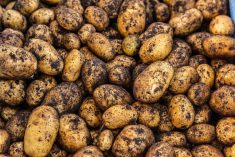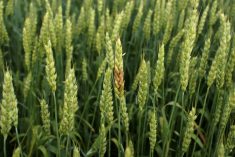Beer was flowing freely at the Canadian Wheat Board (CWB) recently in celebration of a unique project that’s putting more money in malting barley growers’ pockets, encouraging sustainable production and improving a brewers’ beer and bottom line.
Don’t fret, the bill won’t be coming off farmers’ final payments. A keg of “Biggar Beer” was donated by Chico, California-based Sierra Nevada Brewing Co., considered to be among the United States’ premier craft brewers.
Sierra Nevada, Prairie Malt of Biggar, Saskatchewan and some of the barley farmers around there have set up a three-year pilot project that does something never done before – pay farmers a premium for producing high-quality malting barley before they even seed.
Read Also

Mazergroup’s Bob Mazer dies
Mazergroup’s Bob Mazer, who helped grow his family’s company into a string of farm equipment dealerships and the main dealer for New Holland machinery in Saskatchewan and Manitoba, died July 6 from cancer.
Last year, it worked out to $15 an acre. Participants keep the money even if their barley doesn’t get selected. There’s an additional premium if it is selected and meets the brewer’s protein requirements, Stan Cooper, Sierra Nevada’s logistics manager said in an interview Feb. 22 as he sipped a glass of frothy Biggar Beer, a golden ale made from the barley selected through the program.
The idea came from George Mair, who farms south of Biggar. A few years ago, Cooper asked Mair if he could grow lower-protein malting barley, and while he was at it, do it in a more environmentally sustainable way.
Mair said he could, but wouldn’t because there was no incentive. Producing lower-protein barley, which brewers like because it makes more beer, is achieved by cutting back on nitrogen fertilizer. But less fertilizer also means lower yields. Worse yet, barley that isn’t selected for malting is sold for livestock feed at a much lower price.
Mair suggested if Sierra Nevada shared some of the financial risk, he’d consider it. Sierra Nevada agreed and that’s how the “Farming with your brewer” program started.
It’s similar to the contracts some farmers have through several grain companies with British bread maker Warburtons. Warburtons pays farmers a $20-a-tonne premium on top of what they earn through the CWB for specific varieties of top-quality milling wheat. But the farmers must keep detailed records of input applications, segregate the wheat and deliver to meet Warburtons’ schedule.
The big difference with this program is getting some of the premium upfront, said Chantelle Donahue, Prairie
Malt’s Canadian barley supply chain manager.
“This is a unique program and something we’re very proud to be part of,” she said.
“What’s at the heart of this program is a brewery that’s really committed to sustainability and to partnering with them (farmers).”
Cooper said the program makes sense for farmers and Sierra Nevada, which was founded by Ken Grossman in 1980. His focus then was to make the best beer possible and that’s still his goal, Cooper said. To do that, Sierra Nevada buys the best ingredients – whole hops from Yakima, Washington and malted barley, mostly from Canada. The firm uses traditional brewing techniques with the only ingredients being malted barley, hops, water and yeast it grows itself. The more extract that can be pulled from the malted barley, the more beer Sierra Nevada can make.
“If farmers lower the protein (content of their barley) one per cent, we’ll get one per cent more extract,” Cooper said.
If there’s more beer to sell, the company can afford to pay farmers more, and under this program, it does.
But Grossman’s goal isn’t just to make the best beer in the world; he wants to do it in a sustainable way. That’s why 80 to 100 per cent of the electricity the company uses is generated on-site through a combination hydrogen cells and the largest privately owned solar panel array in the U. S. Waste heat is captured and recycled, as is carbon dioxide, Cooper said.
The premium Sierra Nevada pays farmers offsets some of the risk of cutting nitrogen rates back to get lower-protein barley, but there are strings attached.
Farmers must use no till and other soil conservation techniques. They must have an environmental farm plan and they must use GPS guidance systems to reduce pesticide overlap and save on fuel.
Farmers can still apply pesticides to their barley for weed control.
“We’re not farmers,” Cooper said. “We left the decisions on those sort of things to the grower.”
Greg Donahue, one of the farmers in the program, says it isn’t hard to do what Sierra Nevada wants. The biggest risk is reduced yields due to less nitrogen, which the company is offsetting with an extra payment, he said.
“Sierra is the first company that’s said ‘here’s what we want and here’s some cash to help compensate for some of the risk of doing it.’”
Sierra Nevada buys around 14,500 tonnes of malted barley a year, which converts to almost 19,000 tonnes of barley. Most of it comes from Canada.
The company produces more than 720,000 barrels or 85 million litres of beer a year, shipping it to all 50 states and even to Europe. (It is considering exporting to Canada too.)
Whether Sierra Nevada extends its “Farming with your brewer” program depends on the outcome of the three-year trial, Cooper said. Preliminary results look encouraging, he added.
CWB president and CEO Ian White said the “Farming with your brewer” program is the future of niche marketing.
“I think this project is a forerunner of things to come in the industry,” he said. “It’s great to see farmers connected to producers and end-users and we’re very happy to help facilitate that. [email protected]



















